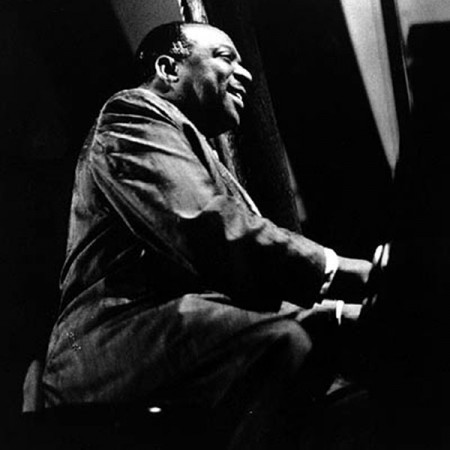
Count Basie (1904–1984)
(Photo: DownBeat Archives)Basie: Oh, Lord, that was so. Yeah.
Teagarden: Have you seen Louis lately?
Basie: No, I haven’t seen Pops in a long time.
Teagarden: I miss him by hours sometimes.
Basie: We’re either ahead of him—or behind him, which is the wrong way to be, behind him, you know. But we worked seven, eight days down in the place in Washington together. Boy, that was great. That was the greatest thing I ever did. Man, we just play eight bars of that theme and nothing is going to happen in the next three minutes.
Teagarden: That’s right. Nothing but applause.
DownBeat: Count, why did you keep a big band going, when it became increasingly difficult to keep bands going?
Basie: ’Cause I was simple. There’s nothing else I could do. I can’t play in a small group because you have to play too much. And, then, I guess I’m simple—I just like that sound, that’s all. Excuse me, gentlemen.
[Teagarden and Basie leave to go on stage for finale; 10 minutes later, they return.]
DownBeat: Count, you’ve had a band since the middle ’30s. When you came up within the so-called big-band era, people were dancing, right?
Basie: Absolutely.
DownBeat: Was business good then?
Basie: Well, that was the dance era.
DownBeat: Now, today, there are just a handful of big bands—two of the best being yours and Maynard’s. How does today differ from the ’30s, as far as people dancing? Do people come to hear the band more than they come to dance? Do you play more concerts than you do dances? Just how is it different?
Basie: I think we play more concerts. I know we do, and we get to play a few dances, mostly at the universities, colleges, and things. But as far as our dance career is concerned, it’s been kind of beat. But for the last year or so, it seems as though it’s picking up a bit. That’s mainly due, I guess, to the wonderful work the disc jockeys have been doing on instrumentals throughout the country.
DownBeat: Can you call your band a jazz band and be a dance band at the same time?
Basie: I think you can.
DownBeat: Why?
Basie: I don’t know, but I think you can.
Ferguson: Basie’s band always sounds like a jazz band to me—if I may insert that—and I know what Basie’s doing when he plays an arrangement for dancing and when he chooses certain numbers when he’s on the concert stage. At times, he will play numbers for dancing that he wouldn’t play on the concert stage. But many of them overlap. It’s not like the old saying: “He has two separate books.” I don’t know if anyone ever really had two separate books—I think that was just a phrase.
DownBeat: Maynard, do you play more concerts than dances?
Ferguson: Yes, I would say so, if we are to include jazz clubs as concerts.
DownBeat: When both of you play dances, are some of the kids hard to get on the floor? In other words, Count, do you have to play different now than you did in the ’30s to get people dancing?
Basie: If we’re playing a dance, we find that slower melodies fill the dance floor. It’s still more of a listening audience that we have, especially if we have the teenagers, but if we do have the older people, naturally they’re not going to dance so much, because their dancing has become cut in half, too—unless you play a little slower so they can get together and reminisce a little.
DownBeat: In the ’30s ...